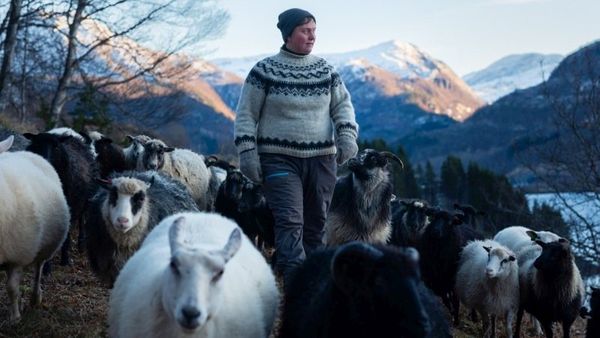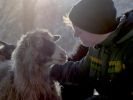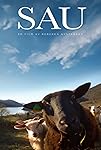Eye For Film >> Movies >> Woolly (2024) Film Review
Woolly
Reviewed by: Amber Wilkinson

Rebekka Nystabakk turns her camera on her own family in this warm-hearted film that comes as a reminder that dramatic turns of events aren’t necessarily needed to create an engaging documentary. Her family run what is now the last farm in their home village and the time has come for her father to pass on the shears to Nystabakk’s sister Rakel, who is relocating north with her wife Ida to take up the job.
Nystabakk indicates that this will be a film that doesn’t take itself too seriously from the off as we are thrown into tupping time at the farm, as the ram gets his annual fun. There’s also an attractive honesty to these early interactions, as their dad notes, with some humour, that “Forty years in the same job is probably enough” and her sister admits, “We don’t know how to run a farm”. That last, it seems, is a slight exaggeration, since this is where the women grew up, which has evidently taught them a thing or two, but still taking on the lot is no small ask.

Where a fictional film might play this sort of set up for tension and fall outs, Nystabakk shows how strong her family unit is. Mum and dad are still willingly getting up early to help - crucial during lambing season - and the whole clan shares a philosophy that values traditional methods over modern assertions that you have to maximise yields at all costs.
As the seasons turn we come to be, like the family, on first name terms with many of the sheep, including pensioner Frøya and little Ståle, who had to be hand-reared and becomes a pixieish pet. Nystabakk allows the family’s philosophy to slowly emerge as much from what we see them do as what they say. The stress of lambing season is evident as is the need to find a balance. Four lambs from a sheep might sound like a good thing on paper but, as Rakel explains, the strain it puts on the sheep is intense.
There’s also a cost of allowing the sheep to go up into the mountain pasture, as many become lost to a lynx. Mixing serious observations about farming in the modern world with more playful goings on down on the farm, this is a love letter to Nystabakk’s family and good animal husbandry. Rakel maybe new to this game but she thinks on her feet and we’re able to see her thinking outside the box to find solutions. And if there’s sadness when some of the sheep go to slaughter, that’s surely how it should be. As she puts it, it’s “the price we pay for having a personal bond with the animals”. In a world of mechanisation, Nystabakk’s film stands alongside other documentary farming gems like Moo Man and Addicted To Sheep, as a reminder that small can be beautiful.
Reviewed on: 27 Apr 2024















